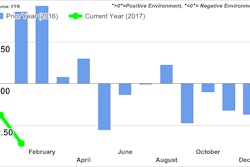As part of its comprehensive efforts to advance tax reform, to promote balanced trade policies, and to support U.S. manufacturing jobs, the Motor & Equipment Manufacturers Association (MEMA) met Friday with White House senior staff members of the National Economic Council (NEC).
The meeting aimed to address issues of top importance to motor vehicle parts suppliers including trade, tax reform, and regulatory reform. The meeting also served to create greater awareness among the Trump administration of the motor vehicle parts supplier industry, which manufactures and remanufactures parts, components, and systems for use in passenger cars and heavy duty vehicles and represents the largest manufacturing sector in the U.S., directly employing more than 871,000 Americans.
“Suppliers play a leading role in job creation and investment growth and are a major contributor to the national economy,” says MEMA President and CEO Steve Handschuh. “For this reason, our participation in discussions like this regarding free trade agreements and tax reform is critical.”
“We felt that they were eager to learn about our industry and to have our input,” says MEMA Executive Vice President of Government Affairs and Automotive Aftermarket Suppliers Association President and COO Bill Long. “This was an important opportunity to establish a working relationship with the Trump administration and to articulate the significant the economic impact our industry has on the American economy.”
During the meeting, MEMA’s team sought a better understanding of the timing and process for changes the Trump administration may be considering regarding review of the North American Free Trade Agreement (NAFTA). The meeting also addressed: the need for corporate tax reform; support of manufacturing jobs in the U.S.; and how a proposed border adjustment tax could impact the motor vehicle supplier industry, including original equipment manufacturers and aftermarket parts manufacturers.
This began the first of many expected conversations with Trump administration officials in the coming weeks on these issues. MEMA and its four specialized divisions recently announced they are aligned with the goals of the Trump administration and Congress to strengthen America’s global manufacturing competitiveness and to create more American jobs. To reach these goals, MEMA supports a simplified, more predictable tax code that would generate investment, economic growth, and job creation in the United States.
Motor vehicle component manufacturers are the largest employer of manufacturing jobs in the U.S., contributing nearly 3 percent of the U.S. gross domestic product. Employment by suppliers is up 19 percent since 2012, generating a total direct and indirect employment impact of 4.26 million jobs. This job growth is made possible by a highly-integrated North American supply chain that supports both the automotive makers and the companies that supply motor vehicle parts. Many suppliers located in the U.S. import and export vehicle parts and components within the North American market. Depending on supply chain logistics, parts are often exported to be combined with other parts, then imported back to the U.S. for final vehicle assembly.
In January, MEMA released an important economic impact study that clearly defines the critical role motor vehicle parts suppliers play in the U.S. economy. A mini version of that report is also available. The motor vehicle component manufacturing industry in the U.S. has experienced robust growth due to increased demand and vehicle sales. The stability and integration of the North American supply chain has been particularly beneficial to suppliers, contributing to growth in jobs and investments in the United States. MEMA supports reasonable tax reform that will allow this trend to continue.



















